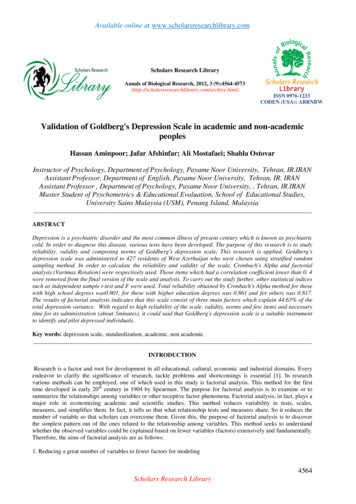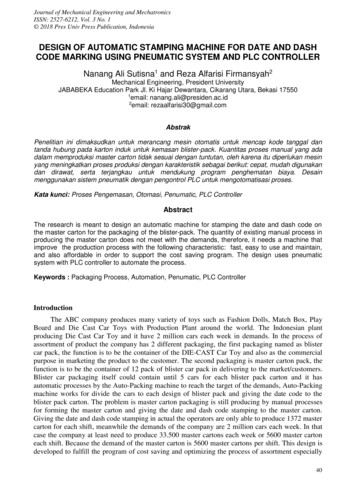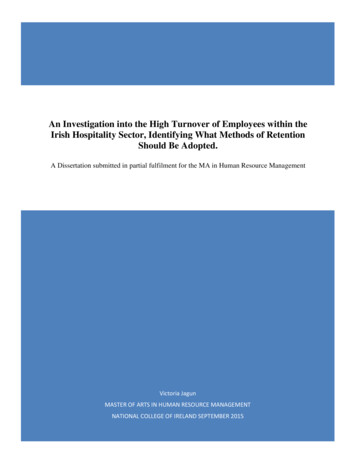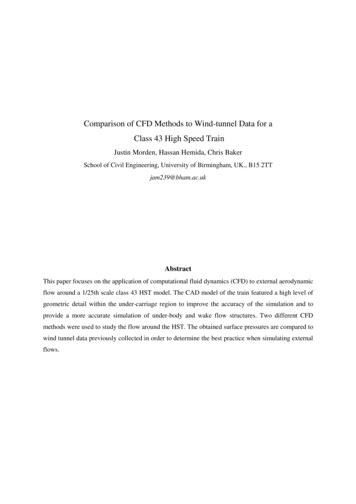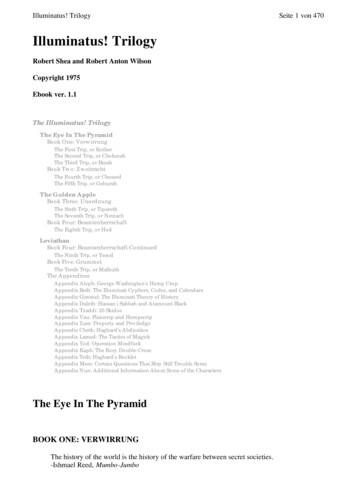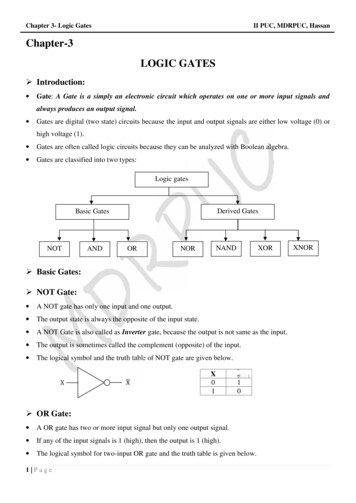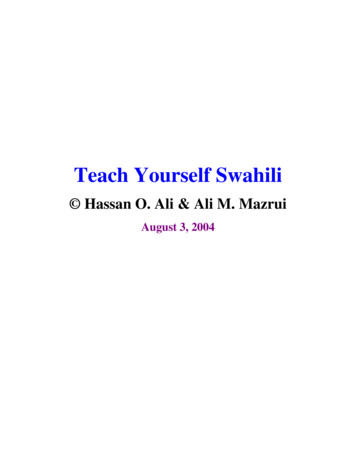
Transcription
Teach Yourself Swahili Hassan O. Ali & Ali M. MazruiAugust 3, 2004
ContentsABOUT THIS COURSE. 1ABOUT SWAHILI. 1LESSON 1:ALPHABET . 3LESSON 2:PRONUNCIATION GUIDE. 3VOWELS . 3SYLLABLES . 3SAME SOUND AS IN ENGLISH: F, H , L, M, N, S, V, W, Y, Z . 4“HARD” CONSONANTS: B, D, G, J. 4“ROLLING” R . 4TWO-CONSONANT COMBINATIONS: CH, DH, GH, KH, MB, MY, ND, NG, NG’, NJ, NY, SH, TH, VY . 5TWO DISTICT SOUNDS: CH, K, P, T . 5ADDITION OF “W”. 6LESSON 3:LETTER SOUNDS . 7LESSON 4:SYLLABLE SOUNDS . 12LESSON 5:EMPHASIS. 13TEST YOURSELF 1 . 14LESSON 6:PERSONAL PRONOUNS . 15LESSON 7:PREFIXES – THE BASICS. 15LESSON 8:PREFIXES FOR PRONOUNS AND TENSES . 17LESSON 9:VERBS . 19LESSON 10:SENTENCE EXAMPLES. 20TEST YOURSELF 2 . 27LESSON 11:GREETINGS. 28LESSON 12:SELF-INTRODUCTION . 28LESSON 13:ASKING FOR DIRECTION . 29LESSON 14:ASKING FOR HELP . 30LESSON 15:RELATIONS. 30LESSON 16:HUMAN BODY PARTS . 31LESSON 17:FOOD. 32LESSON 18:NUMBERS . 33LESSON 19:DAYS OF THE WEEK . 35LESSON 20:TIME. 35LESSON 21:CLOTHES AND ADORNMENT . 37LESSON 22:ANIMALS AND INSECTS. 38LESSON 23:PROFESSIONS. 46LESSON 24:COURTESY AND EMERGENCY . 46i
LESSON 25:ENTERTAINMENT. 47LESSON 26:HOME. 48LESSON 27:OFFICE . 49LESSON 28:TRAVEL. 50LESSON 29:SHOPPING. 51DICTIONARY. 52ii
Teach Yourself SwahiliHassan O. Ali & Ali M. MazruiABOUT THIS COURSEThis is a unique Teach Yourself Swahili course. We have designed it to give you a veryeasy way to learn to speak, read, and even write Swahili words correctly. It gives you theability to learn new Swahili words not only by the way they are written, but also withcorrect pronunciation.We have made great efforts to provide in this course many useful Swahili words that youwill sure find handy in many practical situations. Just click on the words written in blue1to listen to the way the words are correctly pronounced.We hope you’ll enjoy this course!ABOUT SWAHILIFirst of all, is it “Swahili” or “Kiswahili”? It’s both! It’s “Swahili” if you say it inEnglish, and “Kiswahili” if you say it in Swahili. The following example will make itmore clear. The language spoken in France is “French” in English, “Français” in French,and “Kifaransa” in Swahili. Calling the language spoken in Tanzania, “Kiswahili”, whilespeaking in English is like calling the language spoken in France, “Français”, whilespeaking in Swahili instead of “Kifaransa”.Now, what is this language called “Swahili”? It belongs to a family of Bantu (African)languages spoken mostly in eastern, central, and southern Africa. Due to historicalreasons, it has borrowed heavily from Arabic, Persian, Kutchi (Indian), and Englishlanguages. It has also borrowed to a lesser extent from other languages such as German,and Portuguese. While the vocabulary is of mixed origins, the language syntax andgrammar is purely Bantu.For centuries, Swahili remained as the language of the people of the East African coast.In fact the word “Swahili” itself was originally used by early Arab visitors to the coastand it means "the coast". Ultimately it came to be applied to the people and the language.Long-time interactions with other people bordering the Indian Ocean spread the Swahililanguage to distant places such as on the islands of Comoro and Madagascar and even farbeyond to South Africa, Oman and United Arab Emirates. Trade and migration from the1Pronunciation of the words is provided only in the Teach Yourself Swahili CD that can be ordered fromhttp://www.glcom.com/swahili/lessons/teach yourself swahili.html for only US 25. This documentrepresents the CD content – minus the sound.1
Swahili coast during the nineteenth-century helped spread the language to the interior ofparticularly Tanzania. It also reached Uganda, Rwanda, Burundi, Congo, Central AfricanRepublic, and Mozambique.Christian missionaries adopted Swahili as the language of communication to spread theGospel in Eastern Africa. So, the missionaries also helped to spread the language. As amatter of fact the first Swahili-English dictionary was prepared by a missionary. Duringthe colonial time, Swahili was used for communication with the local inhabitants. Hencethe colonial administrators pioneered the effort of standardizing the Swahili language.Zanzibar was the epicenter of culture and commerce. For that reason, colonialadministrators selected the dialect of the Zanzibar (Unguja) town as the Standard Swahili.The Unguja dialect (Kiunguja) was then used for all formal communication such as inschools, in mass media (newspapers and radio), in books and other publications.Now Swahili is spoken in many countries of eastern, central, and southern Africa. ForTanzania, deliberate efforts were made by the independent nation to promote thelanguage (thanks to the efforts of the former head of state, Julius K. Nyerere). Tanzania'sspecial relations with countries of southern Africa was the main reason behind the spreadof Swahili to Zambia, Malawi, South Africa, and other neighboring countries to thesouth. Swahili is the national as well as the official language of Tanzania - almost allTanzanians speak Swahili proficiently and are unified by it. In Kenya and Uganda, it isthe national language, but official correspondence is still conducted in English.Swahili is the most widely spoken language of eastern Africa. It is one of the languagesthat feature in some world radio stations such as, the BBC, Radio Cairo (Egypt), theVoice of America (U.S.A.), Radio Deutschewelle (Germany), Radio MoscowInternational (Russia), Radio Japan International, Radio China International, RadioSudan, and Radio South Africa. The Swahili language is also making its presence in theart world - in songs, theatres, movies and television programs. For example, the lyrics forthe song titled “Liberian girl” by Michael Jackson have Swahili phrases: "Nakupendapia, nakutaka pia, mpenzi we!" (I love you, and I want you, my dear!). The wellcelebrated Disney movie, "The Lion King" featured several Swahili words, for example"simba" (lion), "rafiki" (friend), as the names of the characters. The Swahili phrase"hakuna matata" (No troubles or no problems) was also used in that movie.The promotion of the Swahili language is not only in its use but also deliberate efforts aremade throughout the world to include it in education curriculums for higher institutionsof learning. It is taught in many parts of the world.2
LESSON 1:ALPHABETThe Swahili language doesn’t have its own alphabet. It was originally written using theArabic alphabet. For the sounds missing in the Arabic alphabet like CH and G, Farsicharacters were used. Later on in history, the colonial rulers in East Africa and Christianmissionaries started to write Swahili words using the English alphabet.Swahili words can be written fully using the English alphabet. Some sounds arerepresented by letter combinations – just like in English. For example, the “TH” lettercombination in Swahili sounds the same way as in the English word “THINK”. Nowords, however, use letters “Q”, “X”, and lone “C”. Letter “C” only appears in a “CH”letter combination that sounds like in the English word CHURCH.LESSON 2:PRONUNCIATION GUIDESwahili pronunciation is extremely easy. You’ll learn in this lesson how syllables areconstructed in Swahili and how to pronounce them. We’ll start our lesson with vowels –the most important building blocks of most Swahili syllables.VowelsVowels are called “vokali” in Swahili. They are, a, e, i, o, u - just as in English, butpronounced a little differently. In every Swahili word the vowels make exactly the samesounds – no exception what-so-ever! For example, in English, the vowel “e” soundsdifferently in words “Peter” and “elephant”. It’s not like that in Swahili. Vowel “e” inevery word sounds like “e” as in “elephant”.SyllablesSyllables in Swahili are made of vowels alone, or combinations of consonants andvowels. The exception is with letters “m” and “n” which form syllables just bythemselves in some words e.g. “mtu” (person), “nchi” (country).Swahili people don’t like “hanging consonants” – consonants that are not followed byvowels. Therefore, if your name is “John” with a hanging “n”, they’ll call you “Joni” –with a vowel “i” added at the end. If you’re “Bruce” – with a hanging “s” sound – they’llcall you “Brusi”. If you’re “Rose” – with a hanging “z” sound – they’ll call you “Rozi”.Of course the Arabic name “Salim” becomes “Salimu”. You have to watchout if yourname is “Cook” or “Cooke” because they will call you “Kuku” which actually means“chicken” in Swahili! The most common consonants that can be forgiven to appear in a“hanging” state are “f”, “k”, “l”, “m”, “n”, and “s”, appearing in the middle. For3
example, “afya” (health), “maktaba” (library), “almasi” (diamond), “mamlaka”(authority), “mantiki” (logic), and “mstari” (line).Same sound as in English: f, h , l, m, n, s, v, w, y, zThe above-listed letters make exactly the same sounds as in English:fhlmnsvwyzfarasi (horse), fedha (silver), figo (kidney), foronya (pillow-case), kifua (chest)hatari (danger), hewa (air), historia (history), hoteli (hotel),huduma (service)saladi (salad), leseni (license), limau (lemon), lozi (almond),lugha (language)maji (water), meza (table), mimi (I), moja (one), muhimu (important)nazi (coconut), nane (eight), nani (who), neno (word), nusu (half)safari (journey), serikali (government), siri (secret),sokwe (chimpanzee), kasuku (parrot)vanila (vanilla), veli (veil), vita (war), volkano (volcano),vumbi (dust)watu (people), wembe (razor blade), wiki (week), woga (fear)yaya (maid), yeye (he/she), yeyote (anyone), yunifomu (uniform)zabibu (grape), zege (concrete), ziwa (lake), zoezi (exercise),zulia (carpet)“Hard” consonants: b, d, g, jThe above four letters make sounds that are slightly different from English. They arepronounced in a “hard” way rather than the English “soft” way. For example, the wordfor “father” should correctly be pronounced as “baba”, not “baba”. The word for “boat”is “boti”, not “boti”. The word for “sister” is “dada”, not “dada”. The word for“cheetah” is “duma”, not “duma”. The word for “car” is “gari”, not “gari”. The wordfor “knee” is “goti”, not “goti”. The word for “yesterday” is “jana”, not “jana”. Theword for “jinni” is “jini” not “jini”.“Rolling” rThe letter “r” is always pronounced with a “rolling” tongue. For example, “rangi”(color), “redio” (radio), “habari” (news), “robo” (quarter), “rubani” (pilot).4
Two-consonant combinations: ch, dh, gh, kh, mb, my, nd, ng, ng’, nj,ny, sh, th, vySome Swahili sounds are created using two-consonant combinations as listed above. Thefollowing are examples of words with those consonant a (food), cheche (spark), chizi (cheese), choo (toilet), chupi (underwear)dhahabu (gold), fedheha (shame), dhiki (hardship), dhoruba (storm),dhumna (domino)ghali (expensive), ghorofa (storey), ghuba (gulf),Alkhamisi (Thursday)mbali (far), mbegu (seed), mbili (two), mboga (vegetable), mbuzi (goat)kimya (quiet)ndama (calf), ndevu (beard), ndizi (banana), ndoto (dream), bunduki (gun)ngamia (camel), kengele (bell), ngisi (squid), ngome (fort), nguva (mermaid)ning’iniza (hang), ng’ombe (cow), mung’unye (squash)njaa (hunger), njegere (green peas), njiwa (dove), njozi (dream), njugu (peanuts)nyama (meat), nyeti (sensitive), nyika (bush), nyoka (snake), nyumba (house)shavu (cheek), sheria (law), shingo (neck), shoka (axe), shule (school)thamani (value), theluji (snow), ithibati (proof), kitunguu-thomu (garlic), thuluthi (one-third)vyama (parties), vyema (well), vyovyote (anyhow), vyuma (pieces of iron)Two distict sounds: ch, k, p, tLetter combination “ch”, and letters “k”, “p”, and “t” have two distinct sound formats inSwahili. One format is “light” and the other is “heavy”. The “light” format is exactly thesame as in English. That is, “ch” as in “chat”, “k” as in “keep”, “p” as in “put”, and “t” asin “take”. The “heavy” format can easily be understood through examples.In English it is “chat”, not “chat”; “keep”, not “keep”; “put”, not “put”; “take”, not“take”. However, in Swahili both two sound formats exist and give different meanings towords that have otherwise same spellings. See example below:chkptLightchangu (snapper fish)kaa (crab), mkunga (midwife)paa (deer), pima (two-arm length)taa (rayfish)Heavychangu (mine)kaa (charcoal), mkunga (eel)paa (roof), pima (measure)taa (lamp/light)5
Addition of “w”Letter “w” can be added to some consonants and consonant combinations to give someinteresting sounds. The following are the possible combinations:bw, chw, gw, jw, kw, lw, mbw, mw, ndw, ngw, ng’w, njw, nyw, pw, shw, sw, tw, zw.Syllables made up of those consonant combinations rarely carry vowels “o” and “u”. Thetable below provides some word examples for those letter combinations:Bwana (Mister), bweha (jackal), chubwi (sinker)kichwa (head), uachwe (you should be freed), huachwi (you won’t be freed)amepigwa (he/she has been beaten), apigwe (he/she should be beaten),hapigwi (he/she won’t be beaten)jw ametajwa (he/she has been named), atajwe (he/she should be named),hatajwi (he/she won’t be named)kw kwapa (armpit), kweli (true), kwikwi (hiccup)lw Kilwa (Kilwa – name of a town in Tanzania)mbw mbweu (burp)mw mwaka (year), mwezi (month/moon), mwili (body)ndw ninapendwa (I’m loved), nipendwe (so that I get loved),sipendwi (I’m not loved)ngw Imetungwa (It’s been authored), kongwe (very old),haijengwi (it won’t be built)ng’w ng’wafua (bite forcefully), ng’weng’we (big shot/big boss)njw ugonjwa (disease), isionjwe (It should not be tasted)nyw kinywaji (a drink), nywele (hair), sinywi (I don’t drink),pw pwani (by the acean/coastal), pweza (octopus), kupwita (to pulsate)shw imepitishwa (it has been passed), ipitishwe (it has to be passed),haipitishwi (it will not be passed)sw swala (impala), sweta (sweater), swichi (switch)tw kutwa (all day), tweka (set sail), twiga (giraffe)zw kuongozwa (to be led), niongezwe (I should be given more),siongezwi (I won’t be given more)bwchwgw6
LESSON 3:LETTER SOUNDSHere is a list of various Swahili letters and letter combinations with distinct sounds.Please click on the words written in blue to learn how they sound like in Swahili.AAlmasi (Diamond)BBakuli (Bowl)DDarubini (Microscope)CHChungwa (Orange)CHChui (Leopard)DHDhumna (Domino)7
EEmbe (Mango)GHGhuba (Gulf)KKufuli (Padlock)FFarasi (Horse)HHerini (Earring)GGari (Car)IIliki (Cardamom)KKuku (Chicken)KHKhamisJJicho (Eye)LLozi (Almond)Name of a personMMende (Cockroach)MMdomo (Mouth)MBMbwa (Dog)MBMbuni (Ostrich)8
NNanasi (Pineapple)NDNdizi (Banana)NGNgoma (Drum)NGNge (Scorpion)9
NG’Ng’ombe (Cow)NJNjia (Road)NYNyati (Buffalo)PPaa (Roof)PPaa (Deer)RRoketi (Rocket)TTaa (Lamp/Light)SSimu (Telephone)TTaa (Rayfish)OOfisi (Office)SHShati (Shirt)THTheluji (Snow)UUfunguo (Key)10
VVolkano (Volcano)WWaridi (Rose)YYai (Egg)ZZulia (Carpet)11
LESSON 4:SYLLABLE SOUNDSHere is a list of the syllables made up of one or two consonants and vowels. Please clickon the syllables to hear how they sound WEWIWOWUYYAYEYIYOYUZZAZEZIZOZU12
Here is a list of all the three- and four-letter syllables including letter “W”. Please clickon them to learn how to pronounce them.BCHCHGJKKLMMBNDNGNG’NJNYPPSSHTZLESSON �WINJWINYWIPWIPWISWISHWITWIZWIEMPHASISEmphasis (stress) in Swahili words is so simple to understand. For most words, use thefollowing simple rule: No stress except on the last but one syllable. Of course, in twosyllable words, the first syllable has to be stressed! Here are some maSikiliza!MarekaniSigaraMEANINGHello!FishI’m eatingI don’t wantAn East African country (Wrong pronunciation: Tanzania)MotherListen!United States of AmericaCigarette13
TEST YOURSELF 1Pronounce the following words. Click on them to check if you were correct.WORDHujambo?Sijambo!Hakuna matata!Sina chochote!NinakupendaHongera!Jina lako nani?Mnyang’anyeNing’inizaMEANINGAre you fine?I’m fineNo problem!I’ve got nothing!I love youCongratulations!What’s your name?Snatch it off from himHang it14
LESSON 6:PERSONFirstSecondThirdLESSON 7:PERSONAL ES – THE BASICSThis lesson provides the basic information needed for sentence construction. Mostsentences need verbs. But verbs are a different can of worms in Swahili. And we meanthat literally!Swahili verbs are sticky parasites – just like worms! They have no “life” just bythemselves. They have to attach themselves to other things to make sense (in life). InSwahili, we call those “poor” things “viambishi”, in plural, and “kiambishi” in singular.Viambishi literally means “attachments” which in English are referred to as prefixes,affixes, or suffixes depending on where they appear – at the beginning of the word, in themiddle, or at the end. For the sake of simplicity, we’ll continue to use “viambishi” inplural and “kiambishi” in singular in this course whenever we refer to prefixes, affixes,and suffixes.Viambishi modify verbs in many ways. Primarily they modify verbs to show the subject,the tense, and the object of a sentence. They also modify other parts of speech such asadjectives and possessives to agree with the nouns and pronouns used in the sentence.Viambishi vary with words associated with different classes of nouns. Different nounclasses go with different sets of viambishi. Noun classification itself is not very straightforward in Swahili. There are various ways that Swahili nouns have been classified.Generally the classes are determined by the way the nouns are spoken in singular andplural. Unfortunately there are no short cuts for new Swahili speakers. In most cases theyjust have to know how to speak Swahili words both in singular and plural. That’s why wetook efforts to include plural forms of various useful words in various lessons of thiscourse.We list down below, simplified Swahili noun classes just to show the variation andagreement in viambishi that go with them. In the example sentences, viambishi relatedto the considered noun class are marked in red.15
ENGLISHMtu mrefu amekuja A tall person hascomeYour small child isMtoto wako mdogocryinganaliaYou are my guestWewe ni mgeniwanguNimechukua mkoba I’m carrying a bigbagmkubwaA nice townMji mzuriA horse’s legMguu wa farasiA red eyeJicho jekunduJina lako silijuiI don’t know yournameJani pana la mgomba A wide banana leafKichwa chakekikubwaKijiko cha dhahabuHis head is bigKitabu cha hadithiNdizi yangu mbivuNazi hii ya nani?A story bookMy ripe bananaWhose coconut isthis?A minister’s houseThe Berlin wallA long silk threadNyumba ya waziriUkuta wa BerlinUzi mrefu wa haririUbao wanguUmekaa mahalipanguMahali pazuri pakupumzikiaUlipopapata nipakubwa sanaUtanikuta nyumbanikwanguAkili kichwanikwako!Kwake kuzuriA golden spoonMy boardYou are seating onmy placeA nice resting placeYou’ve achieved alotYou will meet meat my houseBrain in your head!(Think about it!)His/Her place isniceNinakupenda moyoni I love you in myheartmwanguPLURALSWAHILIENGLISHTall persons haveWatu warefucomewamekujaYour small childrenWatoto wakoare cryingwadogo wanaliaYou are my guestsNyinyi ni wageniwanguI’m carrying bigNimechukuabagsmikoba mikubwaNice townsMiji mizuriHorse’s legsMiguu ya farasiRed eyesMacho mekunduI don’t your namesMajina yenusiyajuiMajani mapana ya Wide banana leavesmgombaTheir heads are bigVichwa vyaovikubwaGolden spoonsVijiko vyadhahabuVitabu vya hadithi Story booksNdizi zangu mbivu My ripe bananasWhose coconuts areNazi hizi za nani?these?Minister’s housesNyumba za waziriBerlin wallsKuta za BerlinLong silk threadsNyuzi ndefu zahaririMy boardsMbao zanguYou are seating onMmekaa mwahalimy placesmwanguNice resting placesMwahali muzurimwa kupumzikiaYou’ve achieved aMlimomupata nilotmukubwa sanaYou will meet me atUtanikutanyumbani mwangu my housesBrain in your heads!Akili vichwani(Think about it!)mwenu!His/Her places areMwake muzuriniceWe love you in ourTunakupendaheartsmioyoni mwetu16
Mwako au mwangumote sawa tu!Damu imo mwilinimwanguLESSON 8:In your place or inmy place, all thesame!Blood is in mybodyMwenu au mwetumote sawa tu!Damu imo mwilinimwetuIn your places or inour places, all thesame!Blood is in ourbodiesPREFIXES FOR PRONOUNS AND TENSESAs mentioned above, viambishi (prefixes) vary with different classes of nouns and theirrespective pronouns. The easiest to understand is the way viambishi change withpronouns. In this section we’ll discuss viambishi for personal pronouns of the M-WAnoun class and those for most common tenses. This lesson is intended to provide ageneral sense of how viambishi work in Swahili.Viambishi for the personal pronouns of the M-WA noun class are shown in the iambishi that show the tense of a sentence do not vary with nouns and pronouns. They,obviously, only change with tense as shown ent-na-PresentContinuous-na-Future-ta-Did we say verbs are a different can of worms in Swahili? Yes we did! And if you didn’tbelieve us here are some more facts about verbs and viambishi that may knock your soxoff!Viambishi for subject and tense actually change when used to express a negative action.We’ll show examples of that in a moment but at this point just mark in the two tablesbelow, viambishi for personal pronouns associated with negative actions.17
SHI FOR t-ja-Present-iPresentContinuous-iFuture-ta-For negative actions, sometimes kiambishi, “-to-”, is used instead of “-ta-”, to show thefuture tense. For example, “sitopenda” (I will not like) instead of “sitapenda” (I will notlike).Also note that when the subject is the same as the object, the kiambishi for object isalways “-ji-”, for all pronouns – for positive and negative actions.And lastly, also note that for the present tense, showing a habitual (everyday) action, onlykiambishi “hu-” is normally used to serve both the tense and all forms of subjects.Usually, the actual noun or pronoun would precede the verb to show the subject of thesentence. For example, “Mimi hupenda kusoma” (I like to read); “Watoto hupendakucheza” (Children like to play).Don’t worry if it’s all fuzzy for you now. It will become clearer when we review severalexamples.18
LESSON 9:VERBSBelieve it or not, with the knowledge of viambishi you gained in LESSON 8:, you areready to start creating your own Swahili sentences. But, wait a minute! Most sentencesneed verbs, and we haven’t learned a single verb yet! So, it’s now the right time tointroduce verbs.Since Swahili verbs are “parasites”, it would be difficult to learn stand-alone verbs. Forthat reason, we’ll introduce here, some common verbs in the infinitive form. Observekiambishi, “ku”, at the beginning of each word. This kiambishi is used with theinfinitive form of verbs. When you remove “ku”, the remaining part is the root of theverb. It is this root of the verb viambishi attach to in different akupendakusikilizakutazamakutafutakulipaENGLISHto be ableto buyto cometo cookto cryto drinkto eatto feelto giveto give outto goto hearto laughto like/to loveto listento look atto look forto oshakutazama/kuangaliakufanyakazikuandikaENGLISHto readto removeto sayto seeto sellto sitto sleepto speakto stand upto thinkto travelto wake upto walkto wantto washto watchto workto write19
LESSON 10:SENTENCE EXAMPLESArmed with the knowledge of viambishi, and some verbs, we’re now ready to constructour first Swahili sentences! Let’s start with positive sentences using the verb “soma”(read). In the tables below, viambishi for subject are in red and those for tense are ingreen.FIRST PERSON SINGULARTENSESWAHILIENGLISHI read a bookPastNilisoma kitabuI have read aPresent Perfect NimesomabookkitabuPresentNinasoma kitabu I read a bookPresentNinasoma kitabu I am reading abookContinuousFutureNitasoma kitabu I will read a bookFIRST PERSON PLURALSWAHILIENGLISHWe read a bookTulisoma kitabuWe have read a bookTumesomakitabuTunasoma kitabu We read a bookTunasoma kitabu We are reading abookTutasoma kitabu We will read a bookSECOND PERSON SINGULARTENSESWAHILIENGLISHYou read a bookPastUlisoma kitabuYou have read aPresent Perfect Umesoma kitabubookPresentUnasoma kitabu You read a bookYou are reading aPresentUnasoma kitabuboo
1 Teach Yourself Swahili Hassan O. Ali & Ali M. Mazrui ABOUT THIS COURSE This is a unique Teach Yourself Swahili course. We have designed it to give you a very easy way to learn to speak, read,
